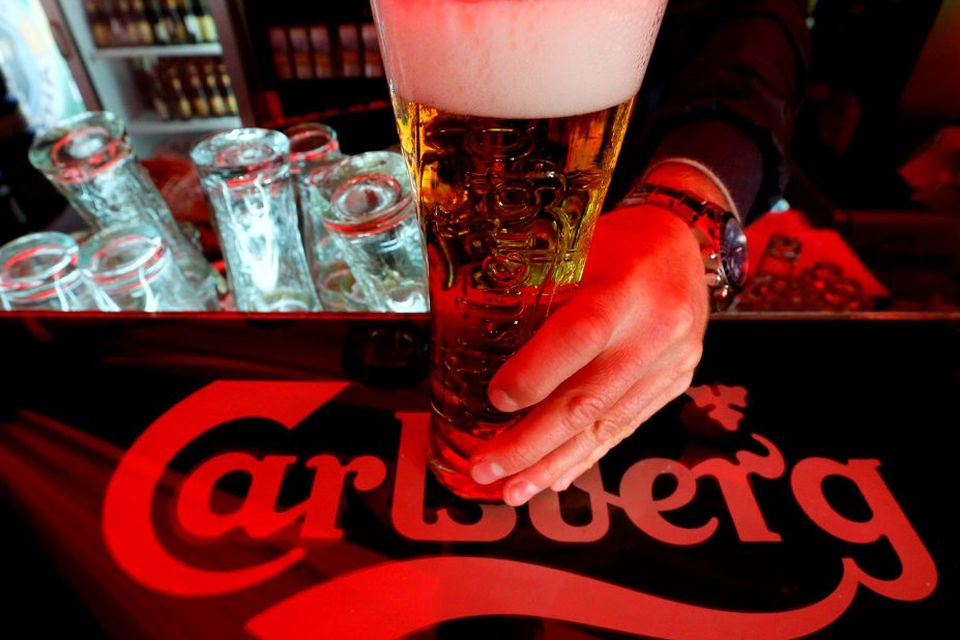Carlsberg dreaming of its best World Cup - probably
Share watch
Carlsberg, headquartered in Copenhagen, has 41,000 employees worldwide and a market value of €14bn. Stock image: Reuters
The catchline on the television advert went: "Carlsberg don't do dreams but if they did, they'd probably be the best dreams in the world."
Preceding this slogan was a riveting 60-second commercial that showed the Republic of Ireland footballers brushing their way past Germany, Spain, Argentina and England in the World Cup semi-final and finally an unstoppable Jason McAteer strike bringing the trophy to Dublin.
Alas, just as the slogan rang out, Jason's alarm clock interrupted his slumber. It's a few years since that wonderful piece of advertising tantalised us, but it is safe to say eight out of every 10 Irish football fans still think it is the best thing to appear on television - ever.
I'm not sure I ever bought a share just because I liked the advertising on telly, but the image of a one-time GAA player winning the World Cup (even in his dreams) would have tempted me.
You have to be paying attention these days to be certain where precisely the world beer markets are going. Ten years ago Carlsberg - together with Heineken - successfully bid for the Scottish and Newcastle group, then the world's seventh largest brewer.
In the breakup, Carlsberg acquired assets in Vietnam, China and control over Russia's largest brewery, which could be important in the upcoming World Cup.
Carlsberg, headquartered in Copenhagen, has 41,000 employees worldwide and a market value of €14bn. It is controlled by the Carlsberg foundation, which has 70pc of all the shareholder votes but only 30pc of the share capital. This ensures the independence of the company and avoids pesky activist shareholders.
It is the fourth largest brewer in the world with more than 500 international and local brands. The group has strong positions in 25 markets across Europe and Asia. In western Europe, Carlsberg is the first or second market leader in 13 markets. It is particularly strong in central and northern Europe.
The region is critical for the group, generating 60pc of total revenues and half the profits. However, the markets are ageing and mature.
In the last decade Asia has become important and China, India, Vietnam and Malaysia accounts for 28pc of operating profits; in 2010 that ratio was 9pc. China is obviously a major target for Carlsberg and the 28 breweries it has operating there account for a third of the region's profits.
Eastern Europe is a problem for the company. It has suffered in Russia since it took control 10 years ago of the brewer Baltika.
The Russian beer market remains a volatile one with a series of tax increases and tough regulations as to where beer can be sold. This market once represented half of Carlsberg's profits, today it is 16pc.
To add to its woes in Russia, Carlsberg faces stiff competition to its leading position. AB inBev, of Budweiser and Stella Artois fame, recently merged their Russian business with Turkey's Anadolu. The new venture will now have 26pc of the declining Russian market just behind Carlsberg's 32pc.
Over the last five years Carlsberg's performance has been patchy. Beer sales have fallen every year and have not been compensated by other beverages.
Revenues, operating profit, operating margins and earnings per share have all fallen. Net profits last year were half that of five years ago.
The share trades today at €93.53 down from its yearly high of €104. The group's strategy of improving operating profits in Western Europe, increasing growth in Asia and arresting a decline in Eastern Europe is making slow progress.
Investors were surprised it passed on the opportunity to acquire the third largest Chinese brand. It also passed on bidding for Hanoi Beer, Vietnam's largest brand and an important market for Carlsberg.
With the massive consolidation taking place in the global beer industry, Carlsberg urgently needs its new strategy implemented as it faces an uphill battle. Hopefully, the World Cup in Russia may produce a bonus or two.
Decent TV advertising always helps, of course.
Nothing in this section should be taken as a recommendation, either explicit or implicit to buy any of the shares mentioned.
Join the Irish Independent WhatsApp channel
Stay up to date with all the latest news















